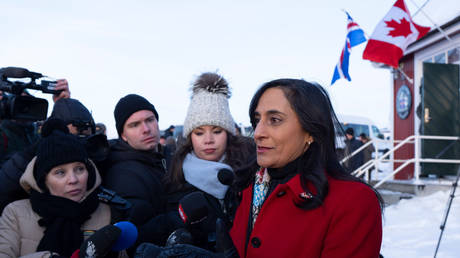
After seven years of tension, Riyadh and Tehran will reopen embassies and revive a 2001 security agreement
Saudi Arabia and Iran agreed on Friday to resume diplomatic ties and re-open embassies within the next two months. Relations between the Sunni kingdom and the Shia republic broke down in 2016, and the two powers have backed opposing sides in multiple regional conflicts.
The agreement came after several days of talks in Beijing. As a result of the negotiations, both countries agreed to reopen their embassies “within a period not exceeding two months,” and to commit to “non-interference” in each other’s internal affairs, according to a joint statement by Saudi, Iranian, and Chinese officials.
Additionally, Riyadh and Tehran said they would resume a security cooperation agreement signed in 2001, and would work to enhance “regional and international peace and security.”
Saudi Arabia severed diplomatic ties with Iran in 2016, after protesters stormed its diplomatic outposts there following the kingdom’s execution of a prominent Shia scholar several days earlier.
Previous rounds of talks aimed at resolving the tensions were held in Iraq and Oman in 2021 and 2022.
Aside from sectarian differences, the two regional powers have clashed on major geopolitical issues. Saudi Arabia has close economic and military relations with the US, while Iran has been heavily sanctioned by Washington over its nuclear program. Successive US administrations have threatened Tehran with diplomatic or military consequences should it develop nuclear weapons, with Defense Secretary Lloyd Austin warning on Thursday that the US “will not allow Iran to acquire a nuclear weapon.”
Riyadh and Tehran support opposing sides in the civil wars in Yemen and Syria, while Iran backs the Hezbollah movement in Lebanon. Saudi Arabia, along with the US and Israel, consider Hezbollah a terrorist group.
In December, Tehran accused Saudi Arabia – along with the US and Israel – of inciting anti-government riots across Iran. Speaking to the IRNA news agency on Friday, Iranian National Security Council chief Ali Shamkhani said that he hopes the agreement will “clear misunderstandings… and lead to the development of regional stability and security.”
Beijing’s role in brokering the agreement is a major diplomatic win for China, which has also positioned itself as a potential middleman between Ukraine and Russia. However, China’s recently published twelve-point proposal was rejected by the US and NATO leadership, and was dismissed by Kiev – where officials stand by their maximalist aims of seizing the Russian territory of Crimea.




